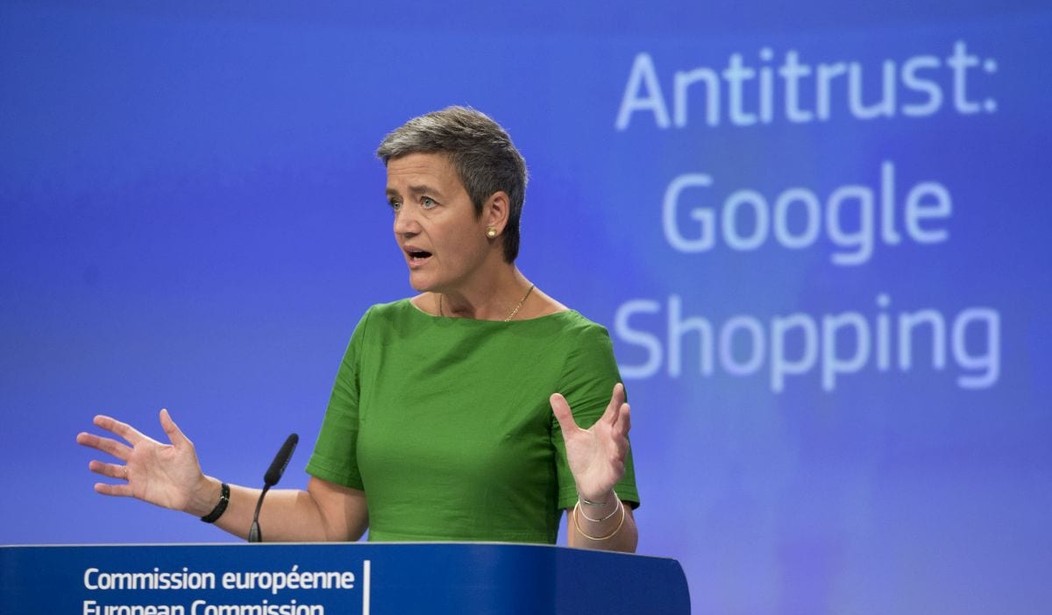Tech giant Alphabet, Inc., parent company of Google, has been slapped with a $2.7 billion fine from the European Union’s antitrust regulator, citing the search engine’s bias in placing its own comparison shopping service companies first.
Google has not decided whether to appeal the decision, and it may be only the first shot in what could become a serious conflict between tech giants and the governments that allow them to operate.
If the ruling sets a precedent that sticks, Google and other large tech firms may have to rethink how they plan to profit from some of their most popular offerings.
Antitrust experts and tech executives say that question arises in areas where tech giants have introduced major innovations—like Google’s search engine—that become gateways to the internet. EU regulators worry that tech firms, by inserting themselves into such a key role of funneling and directing consumer traffic, could take unfair advantage.
Google General Counsel Kent Walker said “we respectfully disagree with the conclusions announced today.” The company will review the decision and consider an appeal.
How Google ends up changing its business model to comply with the EU ruling “could eventually apply to any way that Amazon, Facebook or anyone else offers to search for products or services” depending on “what sort of bottleneck they impose on the process,” said Michael A. Carrier, a law professor at Rutgers University.
In her announcement of the Google decision, EU antitrust chief Margrethe Vestager stressed that dominant companies have special “responsibilities” not to hinder competition—in their own market or any other. “They are not allowed to abuse their power in one market to give themselves an advantage in another,” she said.
The EU has already indicated it is looking at the same potential issue in relation to some of the newest innovations Silicon Valley is pushing, including voice-activated digital assistants, which often provide a sole answer in response to a query.
Those voice-activated devices are going to redefine the industry in ways only dimly perceived at this point. The EU apparently wants to get a head start on regulating them.
There are big hurdles to subjecting digital assistants to antitrust scrutiny. In particular, even in the EU, antitrust regulators would have to determine that one of them is dominant in a certain market for them to be able abuse that dominance. But it is clear the EU is thinking that way with this decision.
“We’re on the brink of doing more oral search, which of course poses new challenges, when it comes to enabling people to have a choice, when it comes to search results, to make sure they get the right answer to their queries,” said EU competition chief Margrethe Vestager in a March interview. “Which is why, instead of being specific on page design or screen design, I think it’s very important to focus on how to allow competition. How to enable that to happen.”
The EU has already charges against Google in three cases in the past two years, ranging from complaints that it has abused the dominance of its operating system Android to force phone makers to promote Google’s mobile applications, to complaints it restricted how a website that offers a Google search function can show advertisements sold by other companies. Google is fighting or responding to all these charges and complaints.
Complainants in Tuesday’s decision, including Yelp Inc., are hoping the shopping case will have broader implications for Google. Complainants also say the precedent should extend to technologies from other companies.
“The principles in this decision are likely to be employed in the digital-assistant context,” said Thomas Vinje, a lawyer for FairSearch, a group of complainants against Google. “These technologies seem likely to be an important part of our lives going forward, and the application of these principles to results delivered by voice assistants is extremely important.”
Unaffiliated experts also believe the questions raised in this Google case will be sticking around for some time, too.
“Software platforms with functions attached to them are going to be the future of every kind of product,” said Keith Hylton, an antitrust professor at Boston University. “This whole issue is going to multiply.”
The net worth of Amazon and Apple are heading for $1 trillion. This mind-boggling number represents more wealth and power than any previous industry ever dreamed of possessing. Even at the height of their power and influence, the robber barons of the early 20th century would be pikers compared to Jeff Bezos and Amazon.
How do we ensure competition in an age where companies get bigger just about every time you turn on your laptop or iPad?
The innovations by these tech giants are marvelous and are transforming the modern world right before our eyes. But how big is too big? Who’s to say this much money is too much? Our whole theory of healthy capitalism may have to be rethought in an age where trillion-dollar companies manipulate markets to their own advantage.
Government regulation of successful businesses should always be watched, but extra attention should be paid to what’s happening in Europe with Google.










Join the conversation as a VIP Member